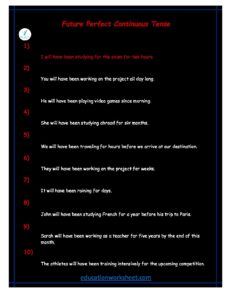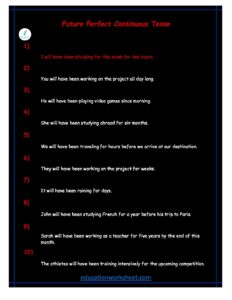how to converting Future Perfect Tense positive sentences to negative form
how to converting Future Perfect Tense positive sentences to negative form
Understanding the Future Perfect Tense
Before we dive into converting future perfect tense sentences into the negative form, it’s crucial to understand the structure and usage of the future perfect tense.
The future perfect tense is formed by using the auxiliary verb “will” (or “shall” for some uses in British English), the auxiliary verb “have,” and the past participle of the main verb. The structure is as follows:
Affirmative Structure: Subject + will/shall + have + past participle of the main verb
For example:
- I will have finished my work by 5 PM.
- She will have completed her assignment before the deadline.
In these sentences, the future perfect tense is used to express that the action (finishing work or completing the assignment) will be completed before a specific point in the future (5 PM or the deadline).
Converting Future Perfect Tense Positive Sentences to Negative Form

Now, let’s move on to the main topic: converting future perfect tense positive sentences into the negative form. Here’s a step-by-step guide to achieving this:
Step 1: Identify the Affirmative Sentence
Start by identifying the positive or affirmative future perfect tense sentence you want to convert into the negative form. For example:
- Affirmative Sentence: She will have graduated by the time you arrive.
Step 2: Identify the Auxiliary Verbs
In the affirmative sentence, identify the auxiliary verbs “will” and “have.” These are the verbs that need to be changed in the negative form.
Step 3: Add “Not” After the Auxiliary Verb “Will”
To make the sentence negative, insert “not” after the auxiliary verb “will.” This will create the negative form of “will,” which is “will not” or its contraction “won’t.”
- Original: She will have graduated by the time you arrive.
- Negative: She will not have graduated by the time you arrive.
Step 4: Keep the Auxiliary Verb “Have” Unchanged
The auxiliary verb “have” remains the same in the negative form. Do not change it.
- Original: She will have graduated by the time you arrive.
- Negative: She will not have graduated by the time you arrive.
how to converting Future Perfect Tense positive sentences to negative form

Step 5: Maintain the Past Participle of the Main Verb
The past participle of the main verb should also stay the same in the negative sentence. There is no change in the verb form.
- Original: She will have graduated by the time you arrive.
- Negative: She will not have graduated by the time you arrive.
Step 6: Combine All Elements for the Negative Form
Put all the elements together to form the negative future perfect tense sentence.
- Affirmative: She will have graduated by the time you arrive.
- Negative: She will not have graduated by the time you arrive.
Step 7: Consider Using Contractions
In everyday language, contractions are often used for brevity and flow. “Will not” can be contracted to “won’t.”
- Negative (with contraction): She won’t have graduated by the time you arrive.
how to converting Future Perfect Tense positive sentences to negative form

By following these steps, you can easily convert an affirmative future perfect tense sentence into its negative form. Now, let’s practice this process with a few more examples to solidify your understanding:
- Affirmative: They will have completed the project by next week. Negative: They will not have completed the project by next week. (or They won’t have completed the project by next week.)
- Affirmative: I will have visited five countries by the end of the year. Negative: I will not have visited five countries by the end of the year. (or I won’t have visited five countries by the end of the year.)
- Affirmative: He will have earned his degree before he starts working. Negative: He will not have earned his degree before he starts working. (or He won’t have earned his degree before he starts working.)
- Affirmative: By the time they return, I will have prepared dinner. Negative: By the time they return, I will not have prepared dinner. (or By the time they return, I won’t have prepared dinner.)
- Affirmative: She will have bought a new car before the end of the month. Negative: She will not have bought a new car before the end of the month. (or She won’t have bought a new car before the end of the month.)

